The views expressed in our content reflect individual perspectives and do not represent the authoritative views of the Baha'i Faith.
From its very beginnings, the Baha’i Faith opposed slavery.
Baha’u’llah’s predecessor, The Bab, whose father died in 1828 when the Bab was quite young, was then raised by a maternal uncle, Haji Mirza Siyyid ‘Ali (who later became an ardent follower of The Bab and one of the early martyrs of the new faith). In 19th-century Persia, virtually every wealthy household owned domestic slaves. The Bab’s guardian had a domestic slave named Mubarak (later known as “Haji Mubarak”).
Dr. Nader Saiedi, a professor of Baha’i Studies in UCLA’s Department of Near Eastern Languages and Cultures, has discovered a previously unknown work of The Bab’s, the Kitab-i Si Duʿa, which means “The Book of Thirty Prayers.” A collection of prayers replete with a wealth of autobiographical information, this newly-discovered work contains remarkable information in which The Bab discloses who was primarily responsible for raising and educating him as a child.
Prayer #7 reflects back on the Bab’s childhood, when the Bab was seven years old. After first praying for his parents, as he often did, The Bab beseeches God to bless the one who nurtured and tutored him throughout his later childhood and adolescence in these stirring words:
Send down, then, upon me, O my God, when I was seven years old and upon him who raised me on Thy behalf, whose name is Mubarak, that which beseemeth the splendours of the sanctity of Thy loftiness and the wonders of the might of Thy revelation. – The Bab (from Nader Saiedi, “The Ethiopian King,” Baha’i Studies Review 17 (2011): 181–186 [183]. Translated by Omid Ghaemmaghami, including provisional translations of works by the Bab cited throughout the article).
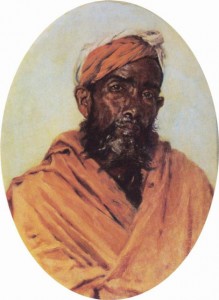
Moslem Servant by Vasily Vereshchagin (1882-83)
Dr. Saiedi cites another text in which the Bab explains that the King of Iran, Muhammad Shah (d. 1848), and his villainous prime minister, Haji Mirza Aqasi (d. 1849), as a consequence of rejecting The Bab as a messenger of God, descended to the nethermost abyss of perdition, while Mubarak, who, to outward appearance, was bereft of any power or earthly rank, ascended to the heaven of glory for “having done good in the realm of faith.” (Saiedi, page 181.)
Dr. Saiedi further states that, throughout this collection of thirty prayers (as well as other prayers revealed by the Bab), the Bab repeatedly prays in following pattern: first, the Bab seeks God’s blessings for his mother and father, and then for “he who raised me.” (Saiedi, page 183.) Previously, Baha’i scholars had assumed that phrase meant The Bab’s guardian uncle – but that is not the case.
The Bab’s reference to “he who raised me,” quoted above, is, in fact, Mubarak, his uncle’s faithful and devoted Ethiopian servant. Dr. Saiedi goes on to say that “the Bab, in fact, places Mubarak on the same plane as his father.” (Saiedi, page 183. Italics added.)
Following this passage, the Bab tenderly thanks God “for the bow and arrow he [Mubarak] made for Me to play with at that age,” and asks God to bless Mubarak with “what is in Thy knowledge of Thy grace and mercy.” (Saiedi, page 183.)
The Bab did not abolish slavery. His life was too short — he was executed on July 9, 1850. Had the Bab lived longer, he surely would have abolished slavery, as a matter of religious principle and as a divine decree, just as Baha’u’llah did. If nothing else, the Bab would have fully agreed with Baha’u’llah’s subsequent religious abolition of slavery.
Eradicating slavery, historically, was a long process. Space does not permit even a brief history, since that was so geographically and socially context-specific. I have written elsewhere on this topic, which the reader can access via the following hyperlinks.
The facts recounted above provide a brief historical background and social context preceding Baha’u’llah’s “Universal Emancipation Proclamation of 1873.” Although the following quote isn’t known by that name, I hope it can now serve as a befitting description and tribute:
It is forbidden you to trade in slaves, be they men or women. It is not for him who is himself a servant to buy another of God’s servants, and this hath been prohibited in His Holy Tablet. Thus, by His mercy, hath the commandment been recorded by the Pen of justice. Let no man exalt himself above another; all are but bondslaves before the Lord, and all exemplify the truth that there is none other God but Him. He, verily, is the All-Wise, Whose wisdom encompasseth all things. — Baha’u’llah, Kitab-i-Aqdas, p. 45.
©2014 by Christopher Buck.
You May Also Like
Comments



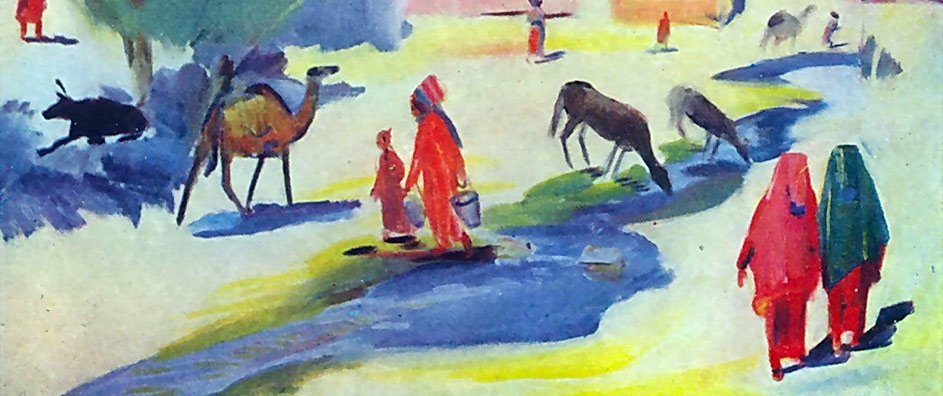




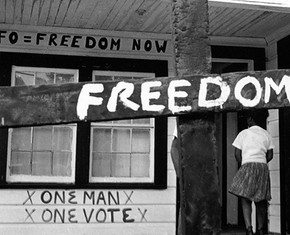




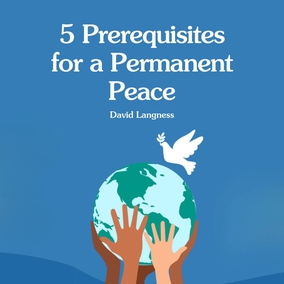

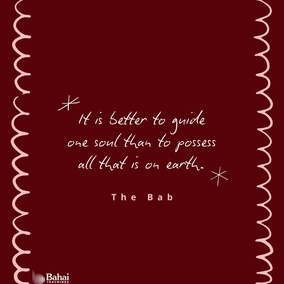


Can you please clarify that it's being used her simply to refer to what Mubarak could have looked like, if not delete it as a reference.
I'm an admin of a Baha'i discussion group and someone posted just the image with the caption "The Bab's father." And wouldn't entertain any questions as to verifying the truth of the statement. Thank you :)
Two niggles.
First, the Bab's knowledge, from earliest childhood, was innate. We know this from His teacher's accounts of what happened when His uncle took Him to school. Dr. Buck is not clear in this piece concerning what he means by "educate". It's important to keep the Bab's unique status and gifts as a Manifestation of God in mind when considering fresh information.
Second, Dr. Buck makes an ...understandable but unfounded assumption about the Bab and slavery. The length of the Bab's ministry did not stop Him from revealing a wide range of laws. Certainly one possibility is the Bab would have abolished slavery had He had more time. Another is that He remained silent on the issue because the time wasn't ripe, or because it was God's inscrutable wisdom that Baha'u'llah order the abolition of slavery instead. A third possibility, given how much of the Bab's work is lost to antiquity, is that He did abolish slavery, and we just don't know.